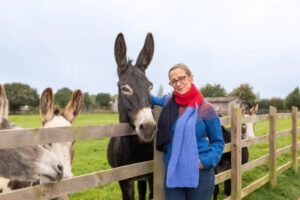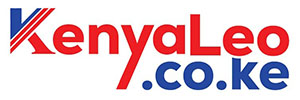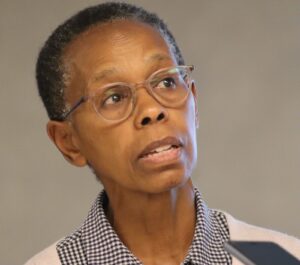
Marianne Steele, The Donkey Sanctuary CEO in Kenya.

By Steve Sabai.
The relationship between donkeys and humans stretches back over millennia. Together we have built civilizations and together we have seen them fall. Side-by-side, donkeys, and humans have fetched water, tilled fields, and endured war, famine, and drought. When natural disasters occur, donkeys guide us through treacherous conditions, providing relief in hostile environments. We are co-workers, partners, companions.
World Animal Day is an opportunity to recognize the incredible ways animals, great and small, enhance and enrich our lives.
The emotional connection between humans and dogs is widely recognized and researched. Their ability to relate means that even in service, they are appreciated beyond their value as a working animal. Around the world, donkeys fulfill a similar role, somewhere between service and companionship. It is a relationship born of utility, but it is their character and essence that makes it much more than that.
As an international donkey welfare charity, we are interested in this relationship from the donkey’s perspective, and how the bond we share can influence their welfare and status in the world. Understanding this is at the heart of some of our recent research.
Donkeys are curious, intelligent, and sensitive creatures. Their limbic system is similar to our own, giving them the capacity to feel a wide range of emotions, just as we do. It is this sense of empathy and loyalty that makes them such valued and trusted companions.
This summer, research we helped to fund into the bond between humans and donkeys was published in the Journal of Applied Animal Welfare Science. The findings showed that across countries and cultures, equids whose owners believed in their capacity to feel emotion were in significantly better health than those whose owners did not. Similarly, in previous research, we found that the donkeys working in India’s brick kilns whose owners used compassionate language toward them had slightly better welfare. In other words, the stronger the emotional bond between a donkey and a human, the better the welfare of that animal.
This research adds scientific weight to what we have been saying for over 50 years – donkeys are sensitive and intelligent individuals who deserve our kindness and respect.
However, the authors caution against making assumptions about owners who did not report an emotional connection and whose animals were in poorer health. The research did not explore if they held back from acknowledging their donkeys’ feelings – not because they are unkind – but because they simply do not have the resources to provide better welfare.
Our mission is to improve the lives of donkeys and mules, every day. The work we do with Action Aid in Ghana and Women and Land Zimbabwe is driven by the symbiotic principle that if we give people the tools and resources to improve the welfare of their donkeys – our priority – their donkeys will be healthier, live longer, and be better able to support their community. This highlights the interconnection between animal welfare and human well-being–what is good for donkeys, is good for humans too.
A second peer-reviewed paper published in the journal Society & Animals explores this connection within communities in central Ethiopia. Here both women and donkeys are marginalised, their work undervalued, and ownership of a donkey can be the difference between modest survival and destitution. However, the bond between these women and their donkeys is much more than utility – one woman described her donkey as a member of my family, and another as ‘my friend’. Supporting these women through education and welfare interventions will not only improve the lives of both women and donkeys, it can elevate their status too, by highlighting the value they bring to their communities and wider society.
Research and experience give us confidence that our focus on a single species, the donkey, can effect wider, positive change for their communities and the places.






